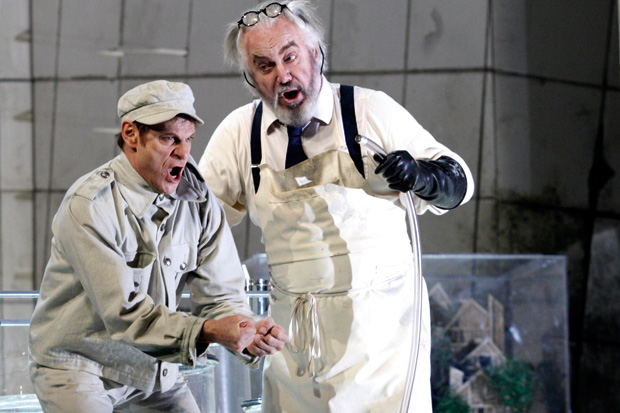When Keith Warner’s production of Berg’s Wozzeck was first produced at the Royal Opera, nine years ago, it made me more angry than any that I had ever seen. At its first revival in 2006, my response was milder, though still outraged. Now, on its third outing, I mind it even less, partly because the musical performance is so strong. Warner has returned to oversee this revival, which, if memory serves, is little different from the last one, so he still regards Wozzeck as the portrayal of an experiment, with Wozzeck as the guinea pig, and the rest of the cast, with minor exceptions, as his tormenting experimenters.
Most of the stage is a huge white room, suggesting a nightmare hospital or a morgue, and containing four large vitrines, with huge toadstools, etc. in three of them. The fourth, filled with formaldehyde, awaits Wozzeck’s self-immersion near the work’s close. Over on the left of the stage is Marie’s apartment, with their son present throughout. The contrast between the extreme frigidity of the main set and the suffocating intensity of Berg’s music is presumably intentional, especially with so musically attuned a person as Warner. The action is removed from any specific social context, unlike the wonderful ENO production that was unveiled a few months ago, and presumably has a metaphysical or existential dimension in the same way that Beckett’s plays do. So Wozzeck’s occasional ejaculation of ‘We poor people’ refers not to his and Marie’s material poverty, but to the human condition in general, or anyway to the condition of those who can be bossed around and abused by most of the people around them.
The trouble with that view of Wozzeck is that the world is not much like that, or large parts of it aren’t. On the other hand, when the cast is so uniformly excellent as the present one, and the conducting of the transcendental order of Mark Elder’s, these worries vanish or become recessive, because the impact, visual and auditory, of the performance is so overwhelming. I had my doubts, to begin with, about Simon Keenlyside’s suitability for Wozzeck: he is so naturally athletic and so responsive that shuffling, looking stupid and autistic is something that he can’t plausibly manage. At the start he tried, but it wasn’t long before he became more flexible, reacted more, and entered into an area of feeling where we could follow and identify with him. His voice was in great shape too, after the first 20 minutes or so, and from then on his maltreatment became a matter of acute torment. The Marie of Karita Mattila was less convincing, because she is a performer on the grand scale, and just can’t cut herself down to Marie’s pitiful size: a strange piece of miscasting. Everyone else was ideal, with specially enthusiastic madmen from Gerhard Siegel’s Captain and John Tomlinson’s Doctor, bringing out — what is surely a crucial element — the macabre humour that makes Wozzeck’s overall grim impact so dreadful.
Elder’s was the most comprehensive account of the score I have heard, and was played gloriously by the Royal Opera Orchestra. Though Elder sought out all the score’s delicacy and lucidity, he also coaxed cataclysmic climaxes, which must be as loud as the building has ever sustained. With Wozzeck there is always, finally, the question between the relationship of what the orchestra is doing and what the action is. They are, to an unusual extent, separate; only at rare moments can one say that the orchestra is accompanying the singing actors, and when it does, as in Marie’s Bible reading and repentance, the result, instantly, is sentimentality. The famous and great orchestral interlude just before the final scene seems to take the work into a new dimension, as if Wozzeck were a great hero dying, and not just a wretched exploited little creature. But that is always a problem (or should I say ‘issue’?).
The Met’s second HD relay this season was of Shostakovich’s early opera The Nose, from Gogol’s short story. If you read the story, you note how understated the most extraordinary events are, and wonder how much Kafka learned from that. Shostakovich certainly learned nothing. This production revelled in exaggeration, was indeed a tour de force on William Kentridge’s part of colourful inventiveness. He produced, was responsible for the many projections, the sets, the whole ambience of the show. What is already an excessive work — in its noisiness, surplus of notes, crudity of satire — began by exhilarating but soon became a marathon for which I hadn’t done any training. The cast was brilliant, with Andrey Popov’s Police Inspector outstanding even in so powerful a line-up. No one wants to see bureaucracy sent up more than I do, no matter how indiscriminately. But any satirical targets The Nose might have got lost in the exuberant excess of every element, and though the opera lasts slightly less than two hours, it felt a lot longer.






Comments